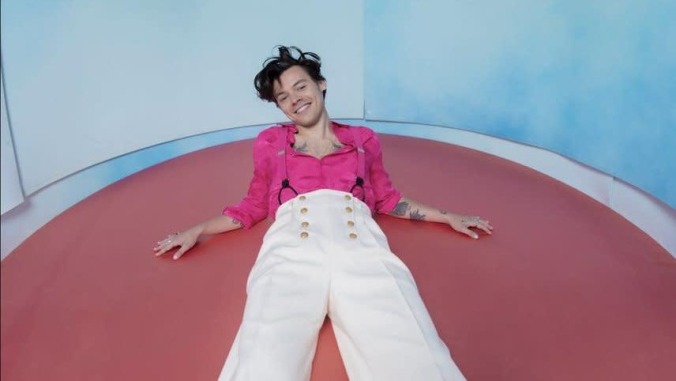With Fine Line, Harry Styles transforms into a California-pop iconoclast

There’s a long tradition of artists heading for the promised land of California seeking musical fortunes. Don Henley and his pre-Eagles band Shiloh moved west from Texas at the behest of Kenny Rogers, who ended up producing an album for the group. In the early ’80s, Axl Rose left behind a turbulent adolescence in Indiana and immersed himself in L.A.’s burgeoning hard-rock scene. So did a nascent Poison, who peaced out from Pennsylvania for the Sunset Strip. And, as this 2018 Los Angeles magazine article notes, a whole slew of artists who first found fame in New York City have since decided to put down roots in the city.
With the release of Fine Line, you can certainly count England-born Harry Styles in this group of musicians soaking up heady inspiration from California’s idyllic weather, sunshine myths, and studio talent. Recorded in part at Rick Rubin’s Shangri-La studio, and featuring string arrangements on several songs from noted L.A. denizen David Campbell, Fine Line oozes laid-back, Golden State chill—both the stuff of idle daydreams (the hazy sparkle-funk of “Sunflower, Vol. 6”) and idle daydreams come true (the aptly titled “Golden”).
On a surface level, Fine Line is an obvious manifestation of Styles’ classic rock and soul fandom. This isn’t new for the pop world—in a sense, both Miguel and Panic At The Disco walked so Harry could fly—although the earnest ways in which Styles incorporates his bygone influences are irresistible. (And, in some cases, mighty impressive: According to Rolling Stone, Styles learned dulcimer for “Canyon Moon” by seeking out Joellen Lapidus, who famously built one of the instruments for Joni Mitchell.)
Kaleidoscopic vocals, courtesy of Lucius and a gospel choir, propel “Treat People With Kindness,” which has a strong ’70s musical theater vibe. “She” is a gnarly prog-pop epic with hollowed-out electric guitar sprawls and seasick sonic atmospheres, while the velvety soul singles “Adore You” and “Lights Up” are luxurious. And while Styles told Rolling Stone that “Canyon Moon” is “Crosby, Stills, and Nash on steroids”—a fair assessment, judging by the porch-jam acoustic guitar as well as the dulcimer—the standout “Golden” boasts echoes of the needling harmonies near the end of CSN’s “Suite: Judy Blue Eyes,” as well as any number of warm, AM Gold pop-rock hits.
Appropriately, Fine Line’s lyrical themes are also timeless: the agony and ecstasy of romance and heartbreak. (More specifically, Styles told Rolling Stone earlier this year the album is “all about having sex and feeling sad.”) The melancholy songs in particular pack a lingering emotional wallop, mainly due to their unsparing introspection. The hushed piano ballad “Falling” is a harrowing account of a breakup’s aftermath (“What if I’m someone I don’t want around?”), while the protagonist of “To Be So Lonely” veers between unflattering self-reflection (“I’m just an arrogant son of a bitch / Who can’t admit when he’s sorry”) and angst over trying to maintain friendship with an ex. “Cherry,” meanwhile, is mired in the petulant stage of a relationship bust-up (“I still miss your accent and your friends / Did you know I still talk to them?”), which also makes it one of the album’s most cutting songs.
Despite these familiar touchstones, Fine Line avoids the obvious trap of being a mere retro rehash. The production and mixing adds radio-ready polish, while its credits reveal modern big names such as Jeff Bhasker (Kanye West, Fun) and Tyler Johnson (Cam, The Head And The Heart). Pino Palladino—the bassist on D’Angelo’s Voodoo and for John Mayer, among others—adds liquid funk to the horn-peppered rocker “Watermelon Sugar” and slinky menace to “She.” The psychedelic-skimming “Sunflower, Vol. 6,” meanwhile, isn’t a far cry from the indie-leaning pop favored by HAIM or Beck, no doubt due to the songwriting/production involvement of Greg Kurstin. And Fine Line offers subtle sonic curveballs throughout that add atmosphere and delightful weirdness. “Cherry” ends with a mournful acoustic interlude that features a recording of Styles’ ex-girlfriend cooing in French that eventually fades into silence, while “Lights Up” stops on a dime for a piano-driven, minor-key pre-chorus that poses the question, “Do you know who you are?”
Of course, not everything on Fine Line works. Sequencing-wise, the album front-loads the uptempo songs and singles, meaning the middle section featuring Styles’ most heartbroken confessions deflates the musical momentum. The album-closing title track is an anemic-sounding, meandering take on Bon Iver’s wintry-folk early days, and the premise of “She”—a company man who daydreams about an unnamed woman, despite having a family life and existing partner—is slight instead of meaningful.
Those last two songs especially underscore that while Fine Line is certainly a commercial slam dunk due to Styles’ popularity, the album is far from a safe creative bet. Luckily, Styles has the charisma, curiosity, and raw talent to pull off even his weirder detours. In fact, Fine Line proves that the musician has absorbed the best lesson passed down by California’s great musicians: Don’t be afraid to take chances within a folk- or pop-rock framework, as that’s how you create iconoclastic music that endures.